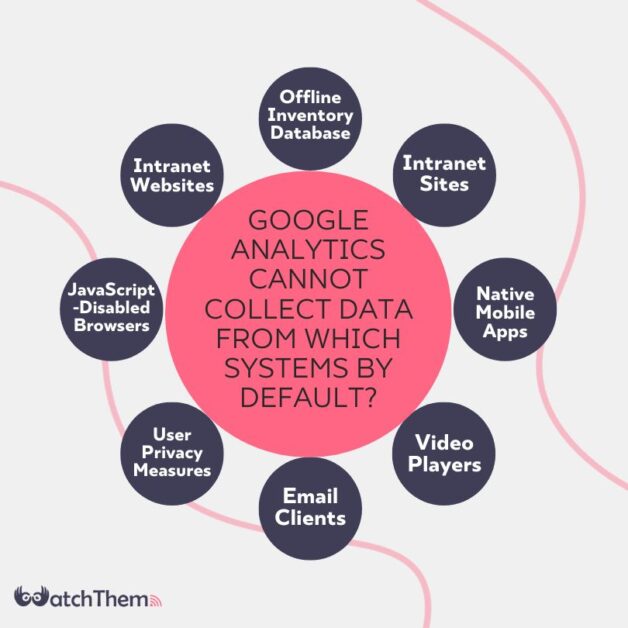Page Contents
There aren’t many people who are unfamiliar with Google Analytics. Whether you’re a marketer, a website owner, or an SEO specialist, you’ve probably used Google Analytics at one point in your business. During your journey, you may have faced questions such as ‘Google Analytics cannot collect data from which systems by default?’.
Even if you’re preparing for the Google Analytics Individual Qualification (GAIQ) Exam, this is a question you’ll likely encounter, making it even more crucial to learn the answer. By having a deep understanding of how GA works and its limitations, you can ensure that your website analytics efforts go smoothly.
In this guide, we’ll elaborate on some key aspects of Google Analytics and address the question about which systems it cannot collect data from by default. We’ll also introduce you to some methods to overcome GA limitations and help make the most out of this tool!
What Is Google Analytics
Before learning the answer to ‘Google Analytics cannot collect data from which systems by default?’, you should know what Google Analytics is and how it works.
Google Analytics is a web analytics service provided by Google that allows website owners and marketers to track and analyze various aspects of their website’s performance. It provides valuable insights into user behavior, traffic sources, conversion data, custom user interactions, and more. The primary goal of Google Analytics is to help website owners make informed decisions based on data-driven insights.
Also Read: Best Google Analytics Alternatives
How It Works
Google Analytics works by tracking website visitors and their interactions and aggregating the data into meaningful reports. Here’s a brief overview of how it operates:
- Tracking Code Installation: Website owners need to install a unique tracking code generated by Google Analytics on their web pages. This code, often referred to as the “JavaScript page tags,” is essential for collecting data.
- Data Collection: Once the tracking code is in place, Google Analytics starts collecting data whenever users visit the website. This data includes information such as page views, sessions, user demographics, and more.
- Processing and Configuration: The collected data is processed and configured within the Google Analytics platform. This involves organizing the information into understandable reports and metrics.
- Reporting: Website owners can access various reports in the Google Analytics interface, gaining insights into user behavior, traffic sources, popular content, and other crucial metrics. These reports aid in making data-driven decisions to improve the website’s performance.
Now that you know what Google Analytics is and how it works, it’s time to answer your questions!
Google Analytics Cannot Collect Data From Which Systems by Default?
The short answer would be: Offline Inventory Database. Google Analytics primarily relies on online data collection methods, and by default, it cannot directly integrate with offline systems such as traditional offline inventory databases. To be able to do that, you’ll need ‘Data import’.
Data import is a feature within Google Analytics that allows you to bring offline data into your online analytics platform. This feature enables you to merge information from your offline inventory database with the online data collected by Google Analytics.
But, that’s not all. There are also other systems that Google Analytics cannot collect data from. So, to know ‘Google Analytics cannot collect data from which systems by default?’, keep scrolling:


#1 Intranet Sites
Google Analytics cannot collect data from intranet sites by default, which are internal networks within organizations. Since these sites are not accessible to the public internet, modifications to the tracking code are necessary to include the internal domain name in the allowed domains list.
#2 Native Mobile Apps
By default, Google Analytics does not collect data from native mobile apps, as they don’t rely on web browsers for access. To track user behavior and app performance, the Google Analytics for Firebase SDK is required, providing a tailored solution for mobile app analytics.
#3 Video Players
Google Analytics cannot directly gather data from video players, which use a different tracking method than web browsers. Modification of the tracking code is needed to incorporate the necessary event-tracking tags for collecting data from video players.
#4 Offline Inventory Database
As we mentioned earlier, Google Analytics is designed to track online user interactions on websites. It cannot directly collect data from offline sources such as physical stores or inventory databases that are not connected to the internet.
#5 Email Clients
GA doesn’t collect data from email clients as emails operate outside the web browser. However, integration with email marketing software allows businesses to track user behavior in emails and link this valuable data to their Google Analytics account.
#6 User Privacy Measures
In the context of user privacy, web browsers with default privacy features, such as “Do Not Track,” can limit Google Analytics data collection. This aligns with the growing emphasis on user data protection and control over how their information is utilized.
#7 JavaScript-Disabled Browsers
Google Analytics heavily relies on JavaScript for tracking user interactions. However, users who disable JavaScript in their browsers for security or performance reasons pose a challenge as Google Analytics cannot collect data under such circumstances, potentially leading to incomplete or inaccurate insights.
#8 Intranet Websites
Designed for public-facing websites, Google Analytics is not suitable for intranet websites. Consequently, it cannot collect data from these internal networks, limiting the ability to analyze internal web usage within organizations.
By now, you’ve learned the answer to a crucial question that you may face when taking the Google certification exams: Google Analytics cannot collect data from which systems by default? Understanding these limitations allows you to better comprehend the scope and functionality of this popular tool.
But that’s not all the limitations you should know about. Let’s take a look.
Google Analytics Limitations
Even though Google Analytics is a powerful tool, like any other platform, it has its limitations that users should be aware of to ensure accurate interpretation of data and effective decision-making. Here are some key limitations of Google Analytics:
- Data Sampling: Large datasets may be sampled, leading to potential inaccuracies in detailed reporting.
- Attribution Modeling Complexity: Choosing the right attribution model can be challenging, and the default last-click model may not fully represent the customer journey.
- Cross-Device Tracking Challenges: Tracking user behavior across devices can be incomplete, affecting the understanding of user interactions and conversions.
- Privacy Concerns and Data Retention: Privacy features may limit data access, and users need to manage data retention settings for historical data.
- Bot Traffic and Spam: Inflated metrics due to bot traffic and spam can distort data, requiring regular review and filtering.
- Limited Real-Time Data Accuracy: Real-time data may experience delays, impacting its accuracy, especially for live events or campaigns.
- Customization Complexity: Creating custom reports and tracking configurations can be challenging for non-technical users.
- Ad Blocking Impact: The use of ad blockers can lead to underreported data on advertising campaign performance.
FAQs: Google Analytics Cannot Collect Data From Which Systems by Default?
Now, let’s address some commonly asked questions that shed light on the specific systems and challenges Google Analytics faces, providing users with a well-rounded understanding of its capabilities and constraints.
Q1. What Cannot be Collected by the Default Analytics Tracking Code?
The default analytics tracking code, like Google Analytics, cannot collect:
- Personal information (PII),
- User behavior outside the tracked website,
- File downloads and interactions with non-HTML content,
- Data from users with ad-blockers or privacy tools,
- Information if JavaScript is disabled,
- Offline interactions, such as in-person purchases,
- Detailed social media engagement without specific setups,
- Detailed user demographics and interests without additional configurations.
Q2. What Information Does Google Analytics Collect?
Google Analytics collects information such as user demographics, session duration, traffic sources, user interactions (events and goals), technology details, geographic data, and e-commerce information. This helps website owners understand visitor behavior, sources of traffic, and the effectiveness of their site.
Q3. Using Tracking Code, Google Analytics Can Report on Data From Which Systems?
GA can report data from the following systems using tracking code:
- E-commerce Platforms: Google Analytics tracking code can capture and report data from e-commerce platforms. It helps businesses analyze the performance of their online stores, track sales, and understand customer behavior related to purchasing products.
- Mobile Applications: The tracking code is capable of collecting and reporting data from mobile applications. This allows organizations to gain insights into user interactions, app usage patterns, and the effectiveness of mobile marketing strategies.
- Online Point-of-Sale (POS) Systems: GA can report on data from online point-of-sale systems. This includes tracking transactions, customer interactions at the point of sale, and evaluating the success of online sales efforts.
Conclusion
In this article, the question ‘Google Analytics cannot collect data from which systems by default?’ has been addressed comprehensively. Understanding these limitations is crucial for users seeking to maximize the potential of Google Analytics.
While Google Analytics is a powerful tool for tracking and analyzing website performance, it is essential to be aware of its limitations, such as data sampling, attribution modeling complexity, cross-device tracking challenges, and others mentioned in this guide.

